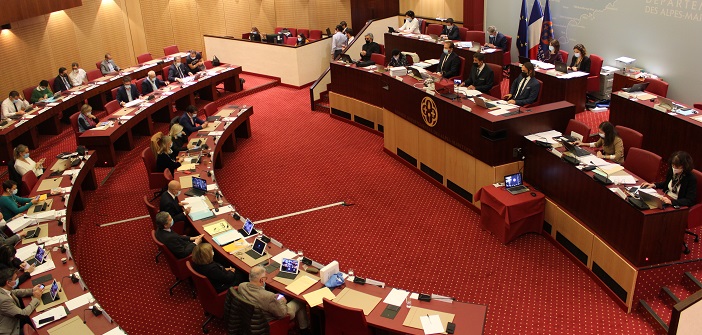It was in a very calm and solemn atmosphere, to pay tribute to the three victims of the attack at the Basilica of Notre Dame in Nice, that yesterday’s plenary session of the Departmental Assembly took place. On the agenda were budgetary orientations for the coming year, but particularly the adaptation of the 2020 budget due to the COVID-19 crisis and storm “Alex.”
About thirty departmental councilors were present in the assembly hall of the departmental hotel for the highly significant plenary session. Due to the lockdown, the other part was connected via videoconference.
As announced three weeks prior, the vote will prioritize managing the health crisis and the reconstruction of the valleys. Although no project has been put on hold at this time, the Alpes-Maritimes department, which had made debt reduction its spearhead for the past five years (-124 million euros of debt erased), will once again resort to a circumstantial loan. Thus, President Charles Ange Ginésy proposed “to increase borrowing by 100 million euros to finance the necessary investments for valley reconstruction.”
For the time being, 60 million euros are being injected with immediate effect to cope with new expenses related to the storm (55 million euros for the “Valley Reconstruction” program and 4 million euros for emergency financial aid to victims). An individual aid for affected businesses amounting to 60,000 euros was also approved.
2021 between security, health, and economic emergencies
With a GDP expected to fall by 11% in 2020 against the backdrop of a near-complete standstill of tourism activity between March and April, and then again in November, or possibly longer… the situation is becoming gradually “dramatic.” A passenger of a moving train that is difficult to stop, the Alpes-Maritimes department is raising the alarm, mentioning an “economy close to collapse” in France. An extraordinary Budget Amendment (BA) has thus been adopted in this context, which could be described as unprecedented. The three main objectives, namely managing the health crisis (the COVID bill already amounts to over 38 million euros, including 6.3 million euros just for purchasing masks), supporting the Azurean economy, and previously mentioned valley reconstruction, must be achieved within a very constrained financial framework.
Exceptional expenses linked to COVID-19, an increase in jobseekers for the RSA (Active Solidarity Income), and the halving of contributions on the added value of businesses… will represent strong budgetary constraints that will not lead to a future-oriented budget.
It is therefore necessary to already think about the future and the departmental recovery, focusing on investments based on renewable energies, the “Green Deal,” and the “Smart Deal.”
Unanimous opposition in this context
As one might expect given the circumstances, the departmental opposition unanimously voted for the agenda. “We believe it is important to show the people of the Alpes-Maritimes that their elected officials are ready to act together and to create a departmental union when circumstances demand it,” stated Marie-Louise Gourdon as the president of the Socialist and Ecologist group.
At the same time, Valérie Tomasini on behalf of the left front, unable to be present due to lack of internet connection, wished to alert the authorities through Francis Tujague: “the residents of Roya are sounding a real alarm. The disaster, the lockdown, the approach of winter, the separation of families, the moral prejudice is great and might worsen if real progress is not quickly observed,” requesting more significant logistical support for the supply of shops and a marked improvement in transport means to access the Roya valley (only two trains run daily on the line).
The year 2021 promises to be delicate with numerous reconstruction projects that will require sacrifices, but above all, state aid, again strongly called for by Charles Ange Ginésy and Eric Ciotti.


